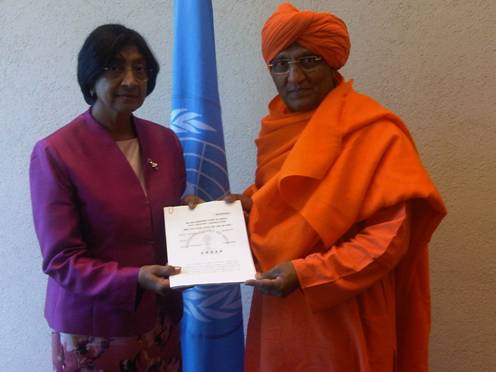Geneva Friday, 14th september, 2012
Translated from French. See original article at: http://www.letemps.ch/Page/Uuid/4ab86660-fde1-11e1-99ed-215ccf06caba/Un_g%C3%A9nocide_culturel_se_d%C3%A9roule_sous_nos_yeux
“A cultural genocide is unfolding under our eyes”

Swami Agnivesh, who is passing through Geneva, denounces Hindu Fundamentalism and also speaks out against the consumerist society of a country that is “among the most corrupt in the world”
Swami Agnivesh visited Geneva this week, especially to meet with Navi Pillay, UN High Commissioner for Human Rights. In an interview with Le Temps, he explained the objective of this visit and also evoked the struggle against corruption in India and put out a warning against religious fanaticism, which could lead to fire and blood in India. Erstwhile professor of Business Management, Minister of Education in the State of Haryana, in 1966 (1968) he took a vow of celibacy and renounced materialism in order to devote his life to spiritual activism.
The High Commissioner listened attentively and expressed her concern regarding the situation and the rights of indigenous people globally. The HC and Swami Agnivesh also discussed other issues of concern in India. She underlined the potential of interfaith initiatives to break down longstanding prejudices and overcome social and cultural injustice.
Le Temps: As a spiritual man, why do you get engaged in politics?
Swami Agnivesh: So called civilized and modern society is distancing itself from spirituality. Society today is consumerist and lives in the illusion that money can buy happiness. India is in the process of forgetting Mahatma Gandhi who taught us to respect others.
-What did you say to the high Commissioner Navi Pillay?
-I wanted to draw her attention to the oppression that the tribal populations of India (Adivasis) are suffering from. They are being uprooted from the forests and mountains that are their natural ancestral environment, purely for the benefit of mining companies. A cultural genocide is being produced in front of our eyes. I came to Geneva to call for solidarity with these voiceless populations.
-But shouldn’t one exploit mineral wealth and develop these extremely poor regions?
-The political and economic elites first think of their own enrichment. They are violating the Indian Constitution, which guarantees the autonomy of these regions (and rights of these tribals). According to the law, the exploitation of these natural resources should be ensured by the State and not by private companies who think above all else of profit. The government is blindly following an economic model that deepens the chasm between rich and poor.
-In India there is today the question of the ‘Coalgate’ scandal, of mining concessions being accorded in exchange for bribes. Where does the fight against corruption stand today?
-India is among the most corrupt countries in the world. Indian legislation against this scourge dates back to 1988. The Activist Anna Hazare, whose close associate I was, demanded the creation of the independent investigation agency. All the politicians say they agree, but don’t pass the necessary legislation in this matter. Last year, the battle against corruption had a great success, but few amongst us became arrogant. I distanced myself from the struggle last August.
- Do you support the call for the resignation of the Prime Minister Manmohan Singh, whose name is cited in ‘Coalgate’?
No I don’t. The call was launched by the opposition (BJP Hindu nationalists) without any argument or proposal. They are practicing parliamentary terrorism. This party represents a danger for inter-religious peace in India.
-What is the situation of interreligious tensions?
The relations between Hindus and Muslims are tense. A spark is enough to set the country alight. We have just lived through a nightmare in the state of Assam, due to tensions between the locals and the Muslim migrants from Bangladesh. Half a million people were evacuated urgently. As a reaction, the Muslims of Mumbai killed two policemen and burnt cars and public buildings. The good news is that Pakistan is now engaging in constructive relations with India. Terrorist attacks have stopped.
-You have irritated hindus by proposing to open temples to members of other religions. A provocation?
-Absolutely not. Last week, I prayed in the company of a Christian devotee in the Great Mosque of Casablanca. Places of prayer should be accessible to believers of all faiths.
There will be a meeting with Swami Agnivesh this evening at 18:30 at the Maison des Association, in Geneva.